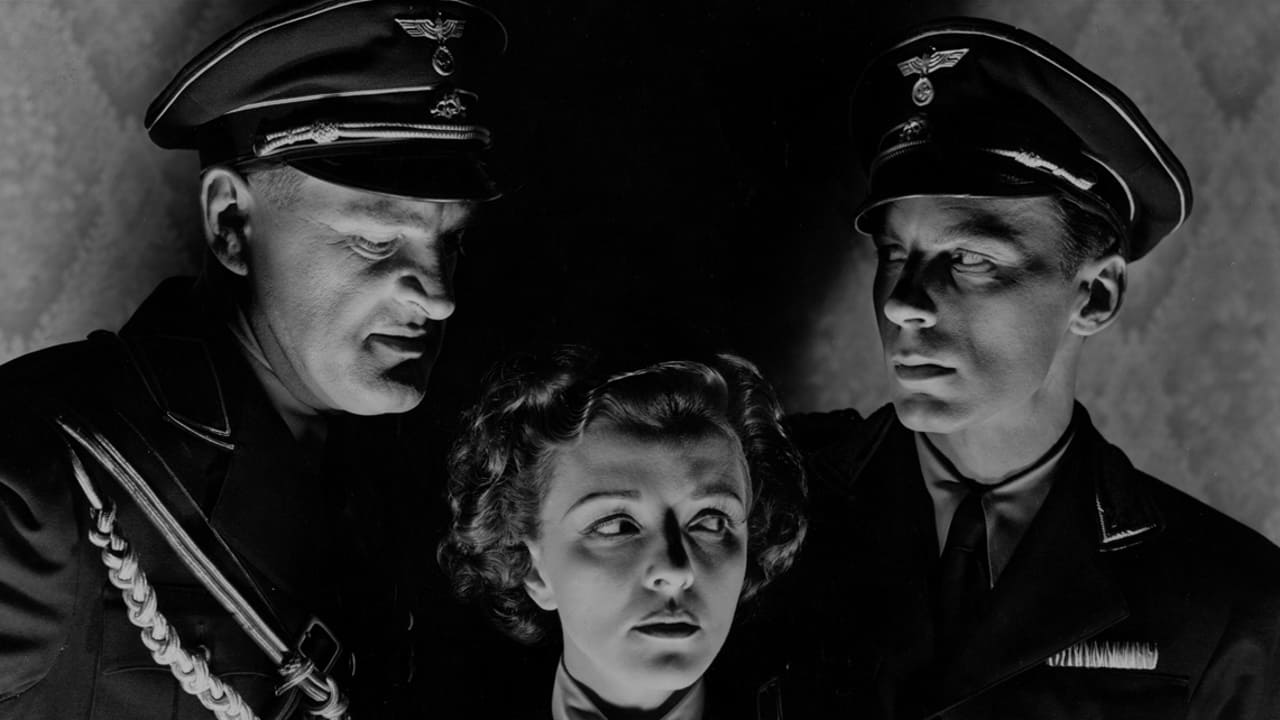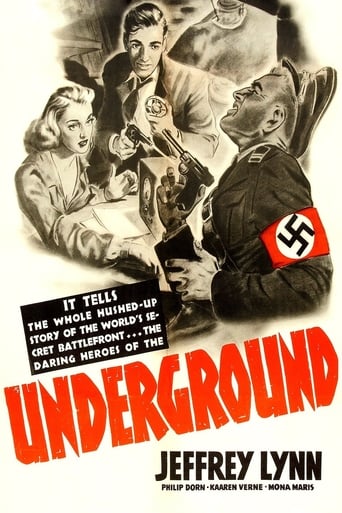

We now have all the answers, but this picture was released before WWII became a world war. It is likely there were rumors and inklings about underground movements but this may have been the first picture about a German resistance movement brought to the attention of the movie-going public. Imagine the surprise and amazement of American audiences trying to fathom the concept that Germany was not a monolith."Underground" is the tense and suspenseful story of two brothers on opposite sides of the war. Jeffrey Lynn is a Nazi officer discharged and returning home after losing an arm in combat and Philip Dorn is his older brother who is a member of the underground. We learn of the consequences to a resistance member if caught and of the attendant paranoia prevalent among members. Secrecy is necessary and required, under penalty of death.The storyline is absorbing and the direction is spot-on throughout. The two stars are at their best, and this may be one of Jeffrey Lynn's best roles. The supporting roles are filled with competent German character actors who may be unfamiliar to many of us. "Underground" is a memorable rendering of a theme which has become very familiar to us over the years since the war. Well worth the time, which is only 95 fast-moving minutes.
... View MoreIn 1941, rising Warner Brothers director Vincent Sherman took two different looks at the World War II underground. The Damon Runyeon like "All Through the Night" took the mugs of New York City and had them exposing Fifth Columnists utilizing an upscale auction shop as their base of operations, and "Underworld" revealed that even the families of World War I who were still haunted by losing that war didn't want to be involved in Hitler's war simply because they knew the motivations for it were wrong. In fact, an entire family finds themselves being torn apart by the political differences between two brothers (Jeffrey Lynn and Philip Dorn), the youngest a devoted Nazi soldier and the other secretly working in the underground.While the outstanding "All Through the Night" focused on comic undertones with a serious main plot, "Underground" is strictly dramatic, and powerfully so. It was released before the United States got involved in World War II, while "All Through the Night" got released almost immediately afterwords. That film had the ironic coincidence of an attempted attack on the New York Harbor, coming just as Pearl Harbor was attacked. Certainly heavy on propaganda, it served the purpose of letting Americans know that just because the enemy was near didn't mean that every citizen of that enemy nation was on the side of evil. The righteous include Lynn and Dorn's parents, a neighbor (Ludwig Stossel, a victim of Nazi villainy in "All Through the Night") who lost his son in battle, a café violin player (Kaaren Verne, "ATTN's" heroine) and even the severe looking assistant (Mona Maris) to nasty Nazi Martin Koslock, also called back by Sherman to play the head speaker at the Nazi meeting in the conclusion of "ATTN". It should be noted that Maris looked pretty much exactly the same in 20th Century Fox's banal "Berlin Correspondent", although in that film, there was no doubt where her loyalties lay.This is one of those war films which grabs you from the beginning and never lets you go. While it is clear that the underground for the most part will come out on top, there are some gripping moments where your doubts take over, such as a chase sequence where Kosleck and his men head to the location where Dorn's radio truck is in the process of delivering an underground message. There's also a hand-ringing confrontation between Dorn and another member of the underground with a recently released concentration prisoner, basically brainwashed by years of torture into doing the Nazi's bidding. When he tries to plead for his life, it almost appears that the good guys are the actual bad guys, but a twist in their decision of how to handle him gives way to a powerful moment of retribution and atonement. The ending is straight out of "A Tale of Two Cities", but is moving rather than corny, even though I found myself quoting Ronald Colman's delivery of Dicken's immortal words in the film's final moments. Verne, whose "All Through the Night" character became involved with the Nazi's merely to save her imprisoned father, is clearly on the side of the underground, and when she is exposed for being the recipient of newly purchased radio equipment, she undergoes a torture so brutal that it is difficult at times to watch, especially when Kosleck forces her to sign a statement indicating that she was treated fairly. Presented with much subtlety, "Underground" is an important film in the sense that almost 75 years later reminds its new audiences to not judge the entire population of a nation by its leaders or military, in other words, to minimize the hate and remember that people of free minds will always stand up to their government, even if their lives are threatened.
... View MoreShould declared as well as intended B-movies be taken for serious or not? Of course, only the affirmation of this question legitimates any possible criticism.Vincent Sherman was one of the classical B-movie directors. If the reason why he directed "Underground" (1941) was of political nature or simply because he needed money - or irresponsibility toward the subject of the movie -, we don't know. However, everybody can find out very easily that the "good guys" in the film - most of all the characters of Kurt and Eric (correctly: Erich) Franken are played by non-Germans (an American and a Dutchman), and that the main "bad guy"-character Colonel Heller was played by the German Martin Kosleck. Besides the only exception of Fräulein Gessner, who was played by the American Mona Maris, one realizes soon that, although all characters are German, the real actors who play the good guys are almost exclusively Americans and the real actors who play the bad guys are almost exclusively Germans.By chance? Let me tell you that no European director would come to the insane idea to let the role of an American character be played by a Non-American. However, especially German characters in American movies are regularly played by American actors imitating American accents as Marlon Brando did in "Morituri". How convincing is a movie in which a French actors plays an American character, revealing after two words his actual origin? However, in "Underground", the things are dramatically different: Issued in 1941 and although a B-movie, this movie was obviously intended to call for Americans to enter World War II and to legitimate beforehand an American meddling in Germany (which still continues by the American presence in nowadays Germany, as every child knows). So, the good characters in this movie are recognizable by the audience via correct American speech of the American actors, while the bad characters are also easily recognizable by the German accents of the German actors.Concluding, let me admit that for once, I have been inconsistent: I enjoyed seeing actors like Kosleck, Ilka Grüning or Ludwig Stössel and I therefore rated this movie with 6 points. However, had I been honest, I would have given a 1, because this movie is nothing else than intellectual filth, a war-chaser and propaganda movie on the lowest possible level.
... View MoreVincent Sherman was on his way up as a film director at Warner Bros. when he was assigned to 'Underground', a low-budget feature without stars to bolster its box-office appeal. Nevertheless, he managed to weave an interesting, fast-paced tale of intrigue and suspense with the Nazi menace hanging like a heavy shadow over the whole film. Basically, it's the story of two brothers torn apart by their beliefs--one (Philip Dorn) is involved in an underground movement, an announcer for a resistance radio program. The other (Jeffrey Lynn) is a loyal German soldier who eventually joins his brother's cause when he realizes what Hitler is doing. This did fairly well at the box-office despite not having big names and deserves to be seen as the forceful war melodrama that it is.Martin Kosleck does his usual turn as a vicious Nazi officer and Mona Maris is convincing as a woman not exactly loyal to the German cause. May not be an "A" feature but it certainly is worth viewing.
... View More